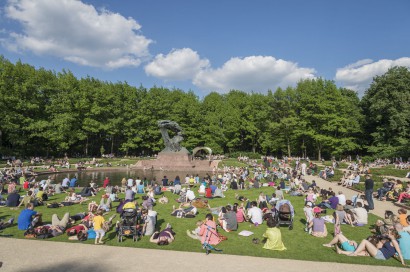

The concerts were first organized in 1959, soon after the reconstruction of the statue. The monument itself had a turbulent history. The idea to set up a monument was first conceived in 1889, on the fortieth anniversary of the composer’s death. However, Poland was then partitioned and the Russian authorities effectively blocked the initiative. It was not until ten years later that the artistic milieu in Warsaw managed to organize a competition to design the monument. The international jury voted the work of renowned Polish sculptor, Wacław Szymanowski, the most interesting and innovative. The result sparked numerous protests and discussions, but the monument was officially unveiled finally on 14 November 1926—a huge scale vision of an inspired Chopin seated beneath a broken willow tree.
In 1939, when Warsaw was under German occupation, Chopin’s music was banned and the monument was blown sky-high (in 1940). The head of the Chopin statue was not found until the end of the war, in the ruins of the Wrocław Coach Factory, and Szymanowski’s work was reconstructed based on the surviving plaster cast. The Fryderyk Chopin monument was installed on its former site in 1958. A year later, the sound of his music emanated from this same place.
The Łazienki recitals have their own history and have been subject to a number of modifications over the years. There are now two classical recitals of Chopin’s music which are given at 12 noon and 4 p.m. each Sunday from May to September. The success of this format is attested to by the huge popularity of the concerts, which attract tourists and the residents of Warsaw alike.
The concerts are also popular thanks to the pianists, who consider it an honour to perform at the Łazienki, irrespective of some of the drawbacks, for example, possible inclement weather. There is one intriguing story concerning Halina Czerna-Stefańska, who managed to complete her recital despite having been stung on the palm of her hand by a wasp! We are confident that this year, mother nature will be kind to the performers and will not spring any such surprises on them and that Chopin’s music will continue to have an unforgettable and profound impact on the audience, as only his music can.